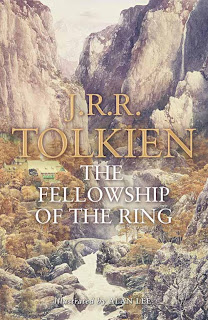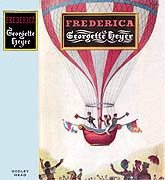 I first started reading Lord of the Rings when I was ten. I loved what I read, but partly through the first book, when Frodo and his friends were at Bree, I put it down and didn’t pick it up again for a year.
I first started reading Lord of the Rings when I was ten. I loved what I read, but partly through the first book, when Frodo and his friends were at Bree, I put it down and didn’t pick it up again for a year.
My older brother, who influenced much of my reading, was not happy. “But you kept telling me you loved it!” he argued. “Why did you stop? You were just telling me how funny it was, how you loved the part at Bree when they were celebrating!”
And it was true. I’d put the book down at what was perhaps the lightest point in the book. Of course, now, I can look back and realize there was a reason I hadn’t put the book down when Frodo was about to be captured by Ringwraiths, or eaten by an evil tree, but at a point where the  tension was relatively low…where he and his friends were (to my ten year old mind) safe and happy.
tension was relatively low…where he and his friends were (to my ten year old mind) safe and happy.
So this offers support to the oft-repeated advice: keep your characters in trouble, the tension high, the suspense building.
However…
I’ve been questioning that recently.
Or, at least, questioning some of the advice that often goes along with that, such as: give your characters one hell of a hard time. Make their greatest fears come true. Keep them always off-balance. Don’t let them win till the end. Start with a bang, with a serious problem, and just keep building the suspense, the drama, the trauma, until at the black moment all is lost…
And, sure, I can see that that can lead to a heck of a page-turner, at least with a protagonist the reader cares about. But is that all there is to life, to novels, and everything?

What about the part of the novel that sticks with you? I can remember gorgeous banquets in Oz, poetry in Middle Earth (and getting drunk at Bree), happy family scenes in Frederica, more banquets at Hogwarts (I guess I love food!), delightfully silly plotless dialogue in Northanger Abbey…
When a reader remembers the world in a book and thinks “I wish I lived there,” I think there’s more going on than breathless page-turning heart-pumping pace. There’s color, and life, and texture. Music. Magic. Depth.
Which is not to say that I’m against pace. Or plot. Or excitement. But nowadays, I think I want to read both.
And I want to write both.
As with everything else, it’s the balance that’s hard. But I’m resolved not to write a book that’s just plot point A, plot point B, turning point, turning point, etc etc. I want to write a world that’s real, a world that’s interesting…a world with banquets.
What do you think? Does a consistently tight pace make a novel’s world shallower, or do you think that’s a false duality? If you think there’s something in it, which do you prefer?
All answers welcome!
(N.B. — I’m actually out of town right now on sudden family business, so I may or may not be able to answer comments in a timely fashion…but I’ll stop in as soon as I can!)
Cara
Cara King, author of MY LADY GAMESTER, in which the pace pauses for an elephant
 From Sense and Sensibility:
From Sense and Sensibility:









